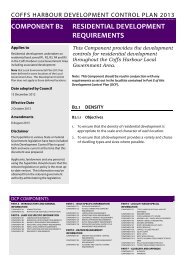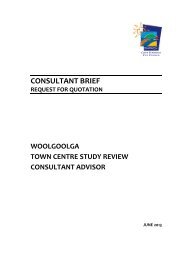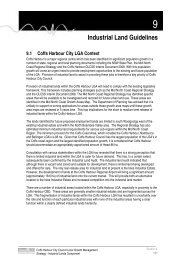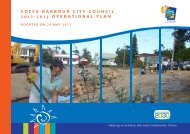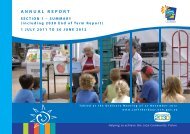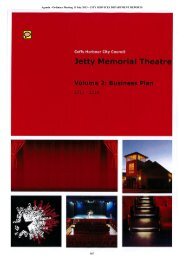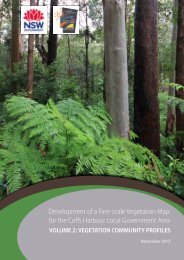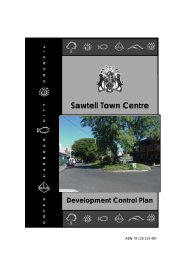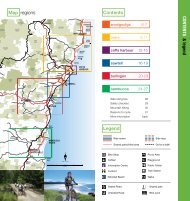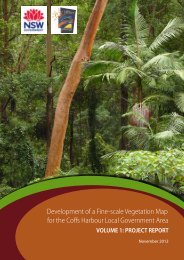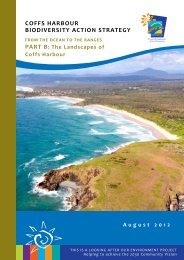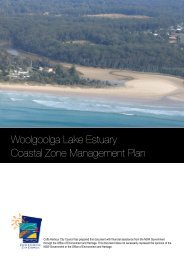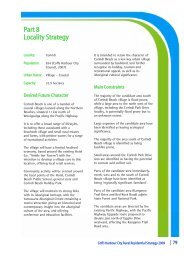Coffs Coast Local Food Futures Part A_Final Report - Coffs Harbour ...
Coffs Coast Local Food Futures Part A_Final Report - Coffs Harbour ...
Coffs Coast Local Food Futures Part A_Final Report - Coffs Harbour ...
Create successful ePaper yourself
Turn your PDF publications into a flip-book with our unique Google optimized e-Paper software.
<strong>Local</strong> <strong>Food</strong> <strong>Futures</strong> Project<br />
<strong>Part</strong> A: <strong>Final</strong> <strong>Report</strong><br />
Embedding<br />
Sustainability<br />
<strong>Local</strong> food as a catalyst for a conversation about<br />
sustainability<br />
To many, sustainability is a difficult concept and<br />
one that is difficult to define. This project has<br />
demonstrated that using the issue of local food<br />
is a fantastic theme around which to explore<br />
and discuss real issues of sustainability. These<br />
include consumerism, peak oil, climate change,<br />
community resilience to sudden change, personal<br />
choices, chemical usage, biodiversity, industrialised<br />
agriculture and the centralised power of large<br />
supermarkets and agricultural/chemical corporations<br />
versus small scale community driven diversified<br />
agriculture.<br />
Offering best practice examples of sustainability and<br />
spaces for conversations about sustainability – building<br />
communities of change<br />
Conversations around sustainability are now<br />
happening and many have been triggered by the<br />
project offering activities and events with the space<br />
for people to network and discuss these issues in<br />
greater depth.<br />
On a local scale, the community gardens offer an ongoing<br />
example of what sustainable food production<br />
can look like, along with other examples of how to<br />
live more sustainably (water conservation, waste<br />
reuse, renewable energy, bush regeneration and<br />
preservation of biodiversity). At the heart of these<br />
gardens is also the idea of social sustainability –<br />
building a community of change, a place where<br />
people can come together to learn new skills and to<br />
build a better future together where people share<br />
resources. A sustainable future will need many more<br />
spaces like these where people can come together,<br />
to reunite as a community, moving us away from the<br />
individualised and decentralised, isolating approaches<br />
of the last 30 years.<br />
In addition to the gardens, the project has helped<br />
build significant networks and partnerships<br />
throughout the community around local food and<br />
sustainability that will be ongoing. The value of<br />
the relationships that have been built through<br />
undertaking these projects together is difficult to<br />
quantify or measure but is critical to any movement<br />
towards sustainability. Indeed it is at the very heart<br />
of it.<br />
Integration of sustainability in government policy<br />
Some progress has been made towards integration<br />
of local food outcomes into council’s policies, plans<br />
and strategies and hence decision-making processes.<br />
The role and value of local food has certainly been<br />
elevated but there is still significant work to be done<br />
in this area if, as a region, we wish to ensure that<br />
we are best positioned to react to future shocks,<br />
such as climate change and peak oil. The threat of<br />
continued urban and sub-urban expansion on our<br />
limited agricultural land remains. Over time however,<br />
with growing community awareness and increasing<br />
social capital, the momentum and pressure will build<br />
to protect our agricultural landscapes and hence the<br />
sustainability of our food supply.<br />
Delays or Difficulties<br />
Encountered<br />
There were a limited number of delays and/or<br />
difficulties encountered over the three year duration<br />
of the project. These are discussed below:<br />
Scope and Capacity for Delivery<br />
The scope of the project, as detailed in the Business<br />
Plan, was in hindsight, very ambitious for a $250,000<br />
project. There was no inclusion in the budget for<br />
salaries, other than nominal payments to cover some<br />
volunteer costs. This meant that the work associated<br />
with the project was undertaken by community<br />
volunteers and in-kind contributions from Council<br />
staff. The amount of work involved in delivering the<br />
various aspects of the project was underestimated<br />
which left people feeling stressed and over committed<br />
at times.<br />
The Project Manager had to juggle many projects<br />
simultaneously limiting their time allocation to<br />
the project. In addition there was a degree of<br />
frustration felt by the Project Manager with a<br />
lack of understanding within Council about it’s<br />
important ongoing role around local food and<br />
community resilience. Specifically, the importance<br />
of council’s role in the development and running of<br />
the community garden and the significant regional<br />
role that the community garden will play was not<br />
well understood. Generating understanding that<br />
local food approaches have a critical role to play in a<br />
sustainable future and that Council is a key facilitator<br />
of this remained a challenge to this project.<br />
20



